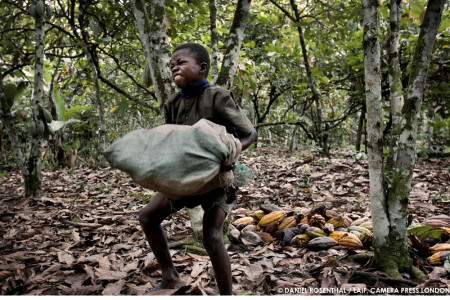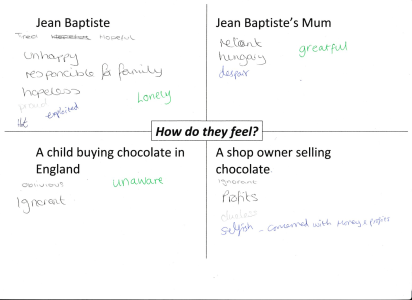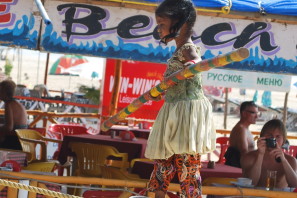Background
Ours is a smaller than average primary school in Hampshire. The catchment is mainly white middle class with 8% of pupils minority ethnic and 14% of pupils qualifying for free school meals. The school has been engaged with Fairtrade for some five years and been a Fairtrade School since January 2012.
The school took part in a project funded by the Fairtrade Foundation with the aim of:
- broadening the children’s thinking about Fairtrade
- helping pupils develop their thinking and understanding about the issues behind the need for Fairtrade
- enabling children to give reasons about why Fairtrade is important and the difference it can make (rather than just saying they support it)
- challenging any assumptions and prejudices about people from different cultures and countries
- challenging any automatic responses about poverty and fairness
- starting to explore big, philosophical questions and to think more openly.
An initial audit activity was carried out with the Year 1 (age 5-6) and Year 5 (age 9-10) pupils. We expected Year 1 children to recognise the Fairtrade logo and say that Fairtrade was a good thing, without any critical analysis or in-depth understanding. We expected Year 5 children to show similar lack of critical analysis, but with some additional knowledge, and to explain why Fairtrade is needed.
Carrying out baseline audit activities:
Year 1 children worked in a carousel, taking part in five activities, with adult helpers instructed to only repeat the question and not to lead children:
- Pupils were asked to prioritise cards about sustainability and social justice and were asked What’s the most important thing I can do to make the world a better place? An adult helper noted pupil responses. The final choices were photographed.
- Pupils were shown photos of children of different ethnicities and were asked What are they like? They were offered the labels: rich, poor, lazy, happy, clever, strange, naughty, funny, lucky, and unhappy. An adult helper noted pupil responses and the final choices were photographed.
- Pupils were provided with a blank map of Africa and asked What would you expect to find if you visited Africa? Children wrote or drew what they expected to find.
- Pupils were asked to write or draw a list of all the FairTrade products they could think of.
- The whole class was asked What do you know about Fairtrade?
Year 5 pupils did the same activities, and were additionally shown a picture of Jean-Baptiste, a 9 year-old worker on a cocoa plantation, with a brief description of his life and work. They were asked of Jean-Baptiste, his mother, a child buying chocolate and a shopkeeper selling chocolate: How do they feel?
Photograph © 2008 Daniel Rosenthal / LAIF, Camera Press London. Ivory Coast, Sinikosson, cocoa plantation, West Africa, October 2, 2008.
Nine year old Jean Baptiste carrying sacks of cocoa pods weighing approx 30 kg on his father’s plantation on the outskirts of the village Sinikosson, Cote d’Ivoire. He doesn’t attend school; work begins at 8.00am and involves cutting fruit off the trees with a machete and removing the beans. The family has no other source of income. Jean Baptiste has no idea what happens to the beans.
The baseline results were much as expected; the responses the children gave showed a basic and shallow understanding of what they were being asked to consider. When one pupil said something, others just repeated what was said, showing limited thinking.
Intervention
The baseline was followed by seven one-hour weekly Philosophy for Children (P4C) sessions, with the same Year 1 and 5 classes, facilitated by a worker from our local Development Education Centre in Hampshire.
A number of age-appropriate stimuli were used to facilitate each philosophical enquiry and stimulate discussion around the concepts of fairness, justice, rights, power, slavery, wealth and poverty, equality, exploitation and responsibility. Stimuli included stories and film clips, including Mahmoud’s Film from Save the Children Fund, activities that helped children link what they had eaten that day with different people, an eating meditation, and role-play activities around fairness and unfairness.
Follow up audit and analysis
The baseline activities were then repeated with each class. Interestingly, the activity on sustainability showed no meaningful change.
For the activity What would you see in a country in Africa? at baseline the main focus was on wildlife; this remained the case with Year 1 children. Representations of people were absent with Year 1 and basic and stereotypical with Year 5. There was one sky-scraper but other built features were basic houses.
The follow-up audit showed a big increase in comments about economic activity, particularly farming, and comments about people were far less stereotypical. Year 5 maps showed a big increase in roads and cities, showing a greater balance between rural and urban.
This What would make most difference? activity demonstrated the most marked impact of the work, with pupils showing more engagement with the questions at follow-up, (73 responses compared to 32 at baseline), and making more detailed and individual observations
How do they feel? about child cocoa farmer Jean Baptiste – Year 5 only
| Baseline | Follow-up |
| How does Jean-Baptiste feel? | |
| Sad/depressed/unhappy x 4
Poor Hungry x 2 Pain/agony Tired/exhausted x 2 Dying Hot Wants to know what chocolate is Expects more gratefulness from consumers
|
Annoyed/frustrated x 4
Curious Grateful Sad/miserable/unhappy x 5 Bored/fed up x 2 Tired/exhausted x 5 Confused x 2 Upset x 3 It’s cruel Happy Left out Jealous/ it’s unfair x 2 |
| How does Jean-Baptiste’s Mother feel? | |
| Gutted
Horrified In distress/sad x 2 Sorry for Jean-Baptiste x 2
|
Grateful x 2
Worried/nervous x 5 Proud x 3 Annoyed Sad Guilty Happy Relieved Frustrated Sorry for Jean-Baptiste x 2 Normal It’s fair |
| How does a child buying chocolate feel? | |
| Happy x 3
Hungry Doesn’t care Ungrateful Doesn’t understand
|
Callous/ doesn’t care x 4
Thoughtful/ does care x 4 Yummy x 2 Don’t think about it x 4 Happy Ungrateful |
| How does a shopkeeper selling chocolate feel? | |
| Happy
Excited About money Doesn’t care Bored Ignorant |
Happy x 2
Money/profit x 3 Ungrateful Doesn’t care x 2 Doesn’t think about it
|
After the Fairtrade sessions, children found more similarities and made fewer stereotypical/poverty observations, although the percentage of assumptions remained the same.
When asked for a second time, What do you know about Fairtrade? children in both year groups gave more detailed and informed responses. One child in Year 1 said that she hadn’t realised before that Fairtrade farmers were real.
These audit activities were able to demonstrate the power of P4C as a tool for Global Citizenship. After just seven weekly sessions, the children showed a greater depth of understanding about the topics explored. Instead of just latching onto each other’s answers, they were keen to express their own thinking. The answers they gave were fuller for the follow-up, and some stereotypical assumptions made at first were no longer being expressed.
The most exciting impact was that the children appeared to show more empathy and engagement with people whose lives are different from their own; this was particularly apparent in responses to the photograph of Jean-Baptiste.
We would expect a much greater impact if this work was sustained over a longer period. Unfortunately the teacher who was to take the lead on embedding P4C across the school left soon after completion of this work.
Reflection on whole process
I think Year 1 (age 5-6) pupils found it difficult to engage with deeper thinking, as they still function at a more concrete and simple level. There is value in working with pupils of this age, but it should be sustained over a longer period. The activity using choice cards about sustainability was too hard for this age group, but all the other activities provided useful information.
This was an extremely valuable process I would like to see delivered regularly across the school. In an age where children are largely spoon-fed, using a methodology where children are encouraged to think for themselves, and develop communication skills, is particularly important. For sustained impact and for skills honed during P4C sessions to permeate the learning environment – this would need to be a regular feature in their learning.
If learning involves an increase in empathy and critical thinking, I believe the impact will be much more lasting. Children who have asked questions about what they are learning are much more likely to remember what they have learnt.




